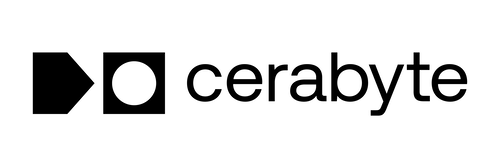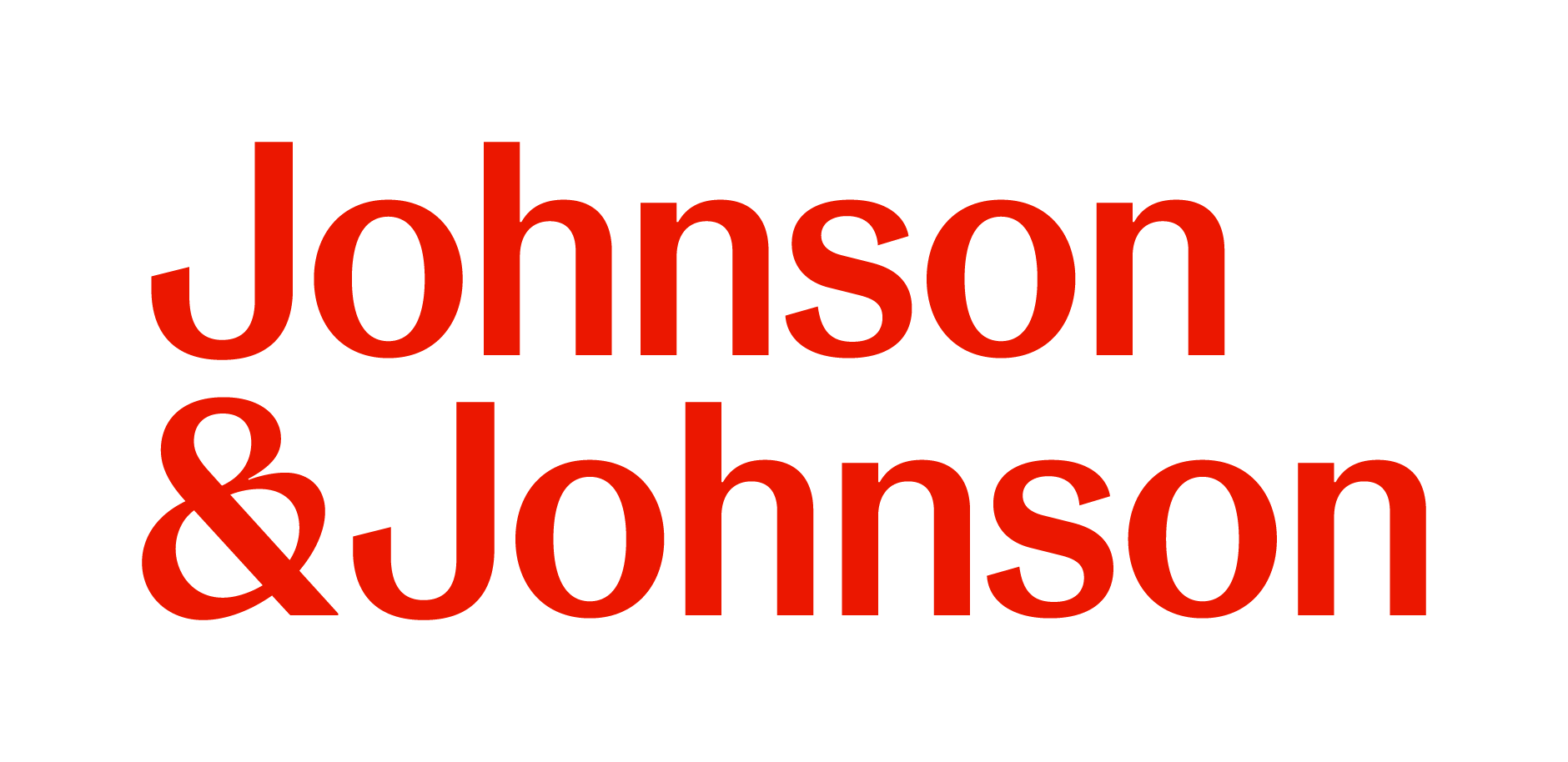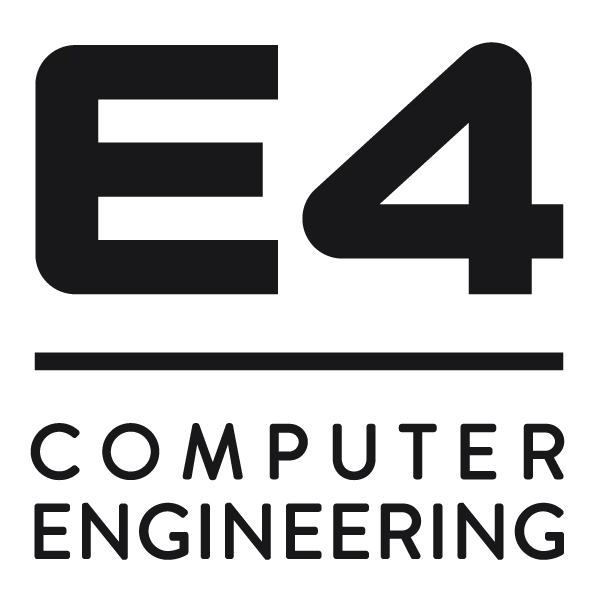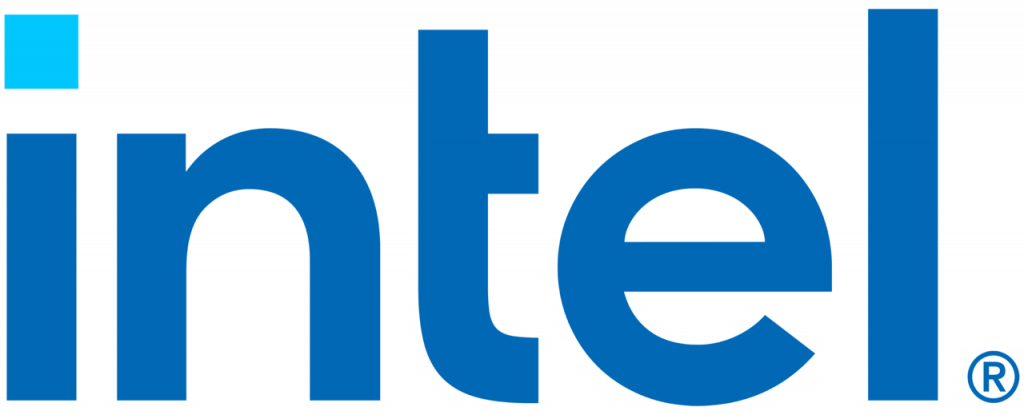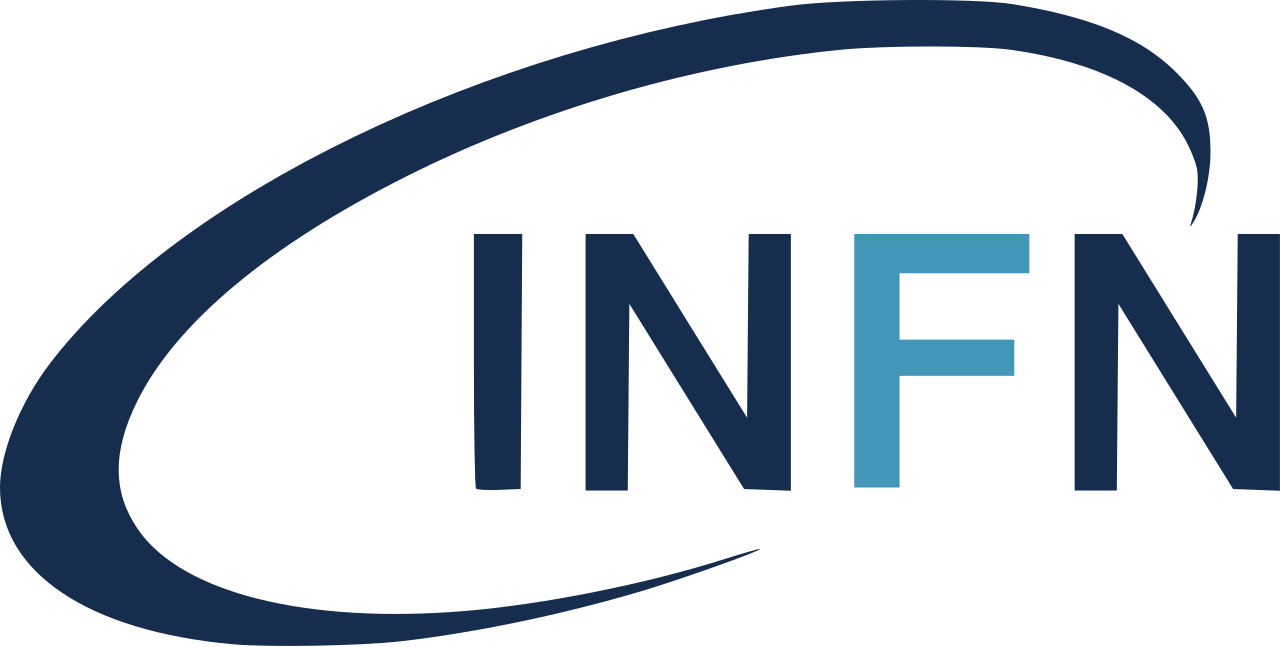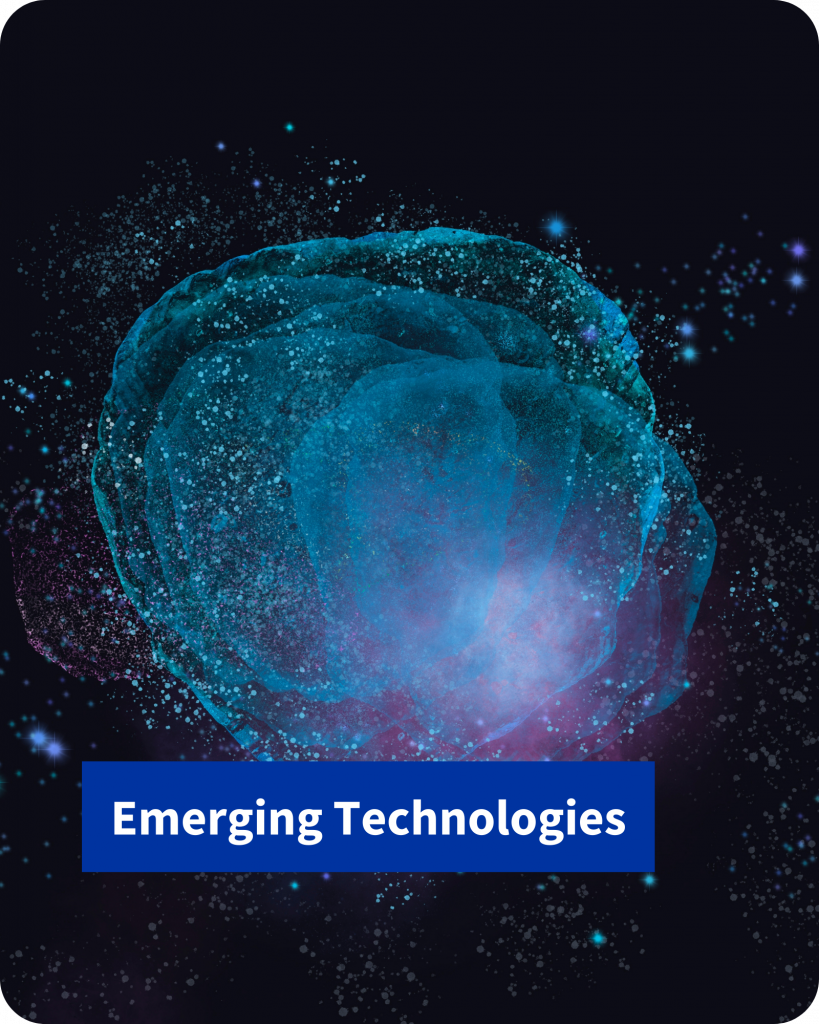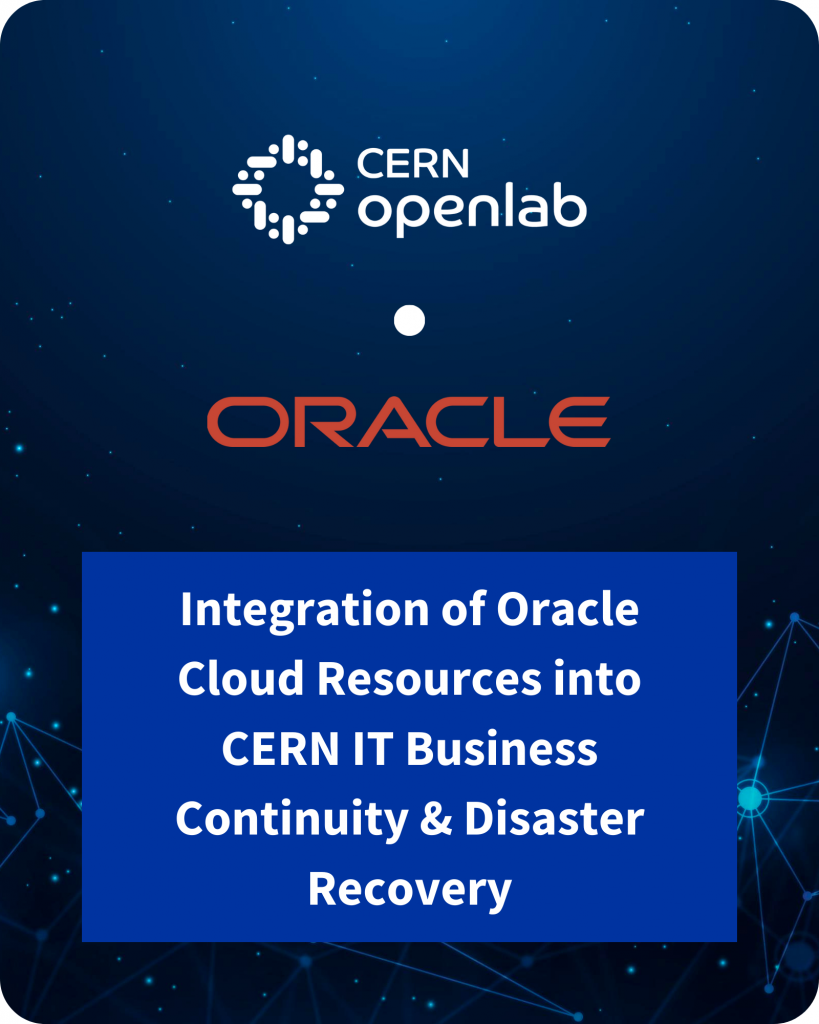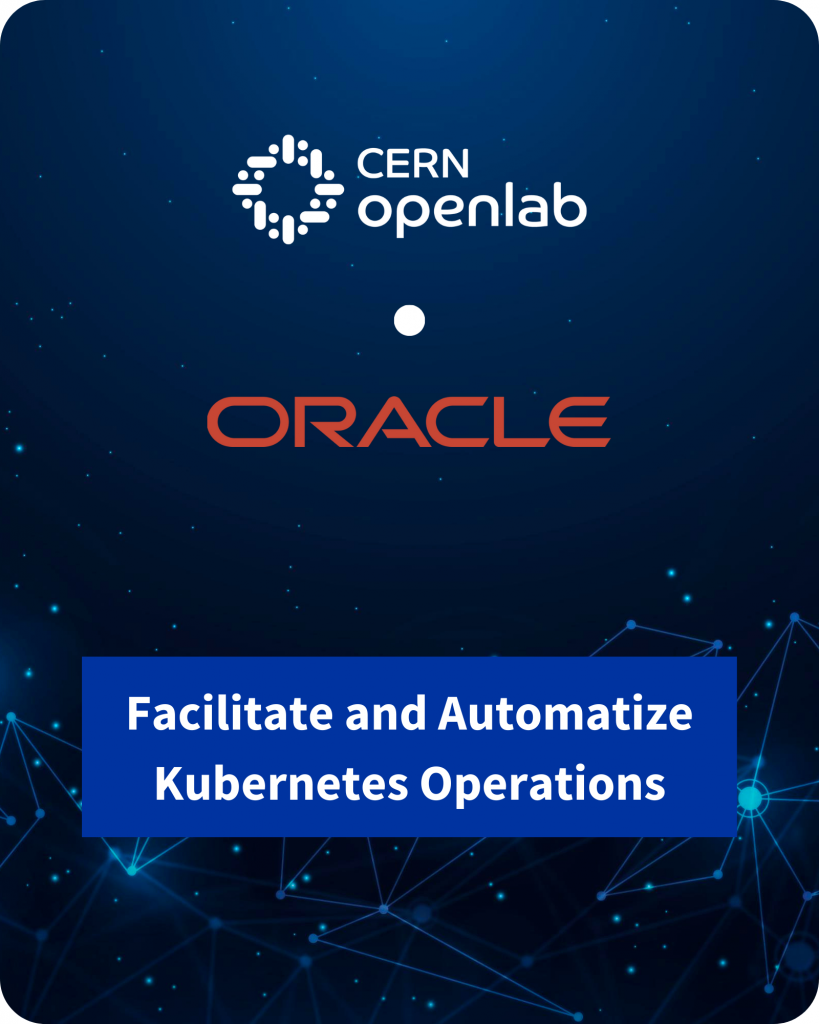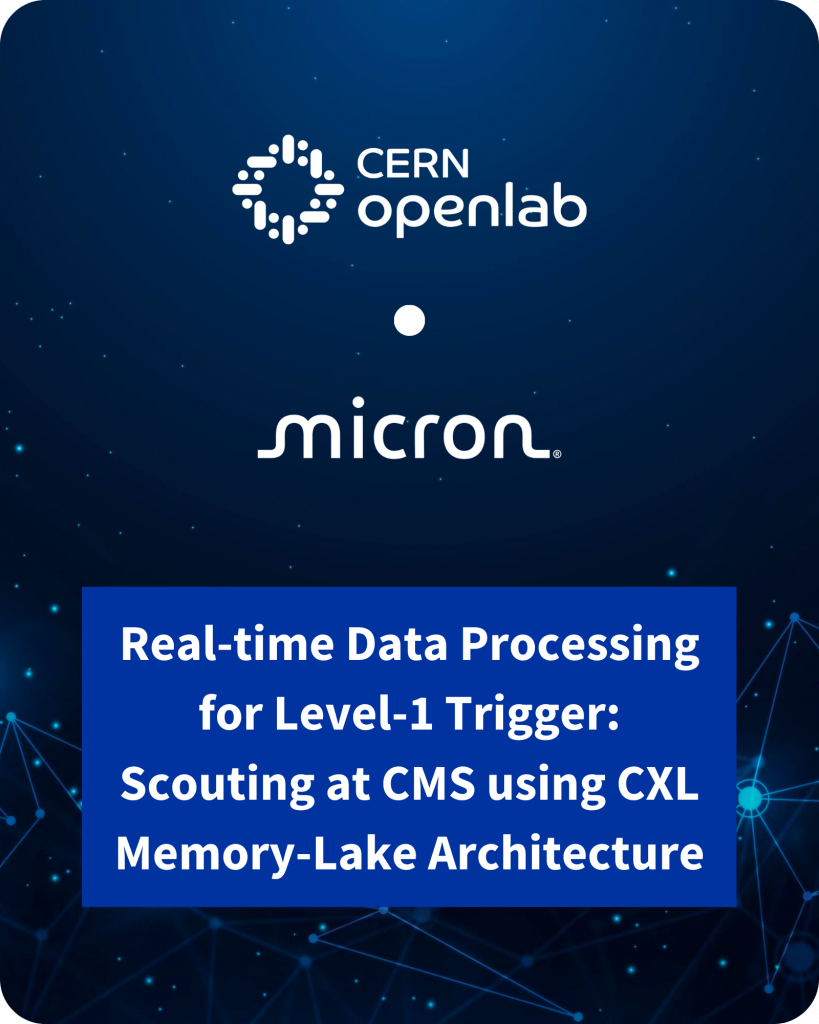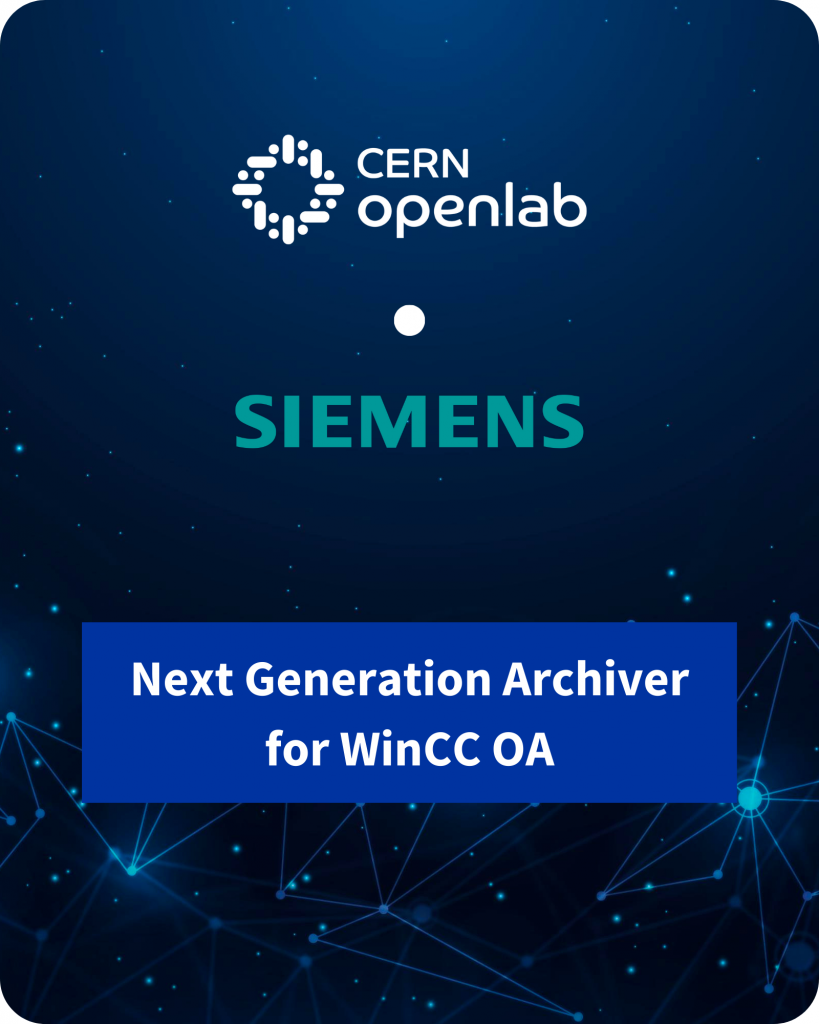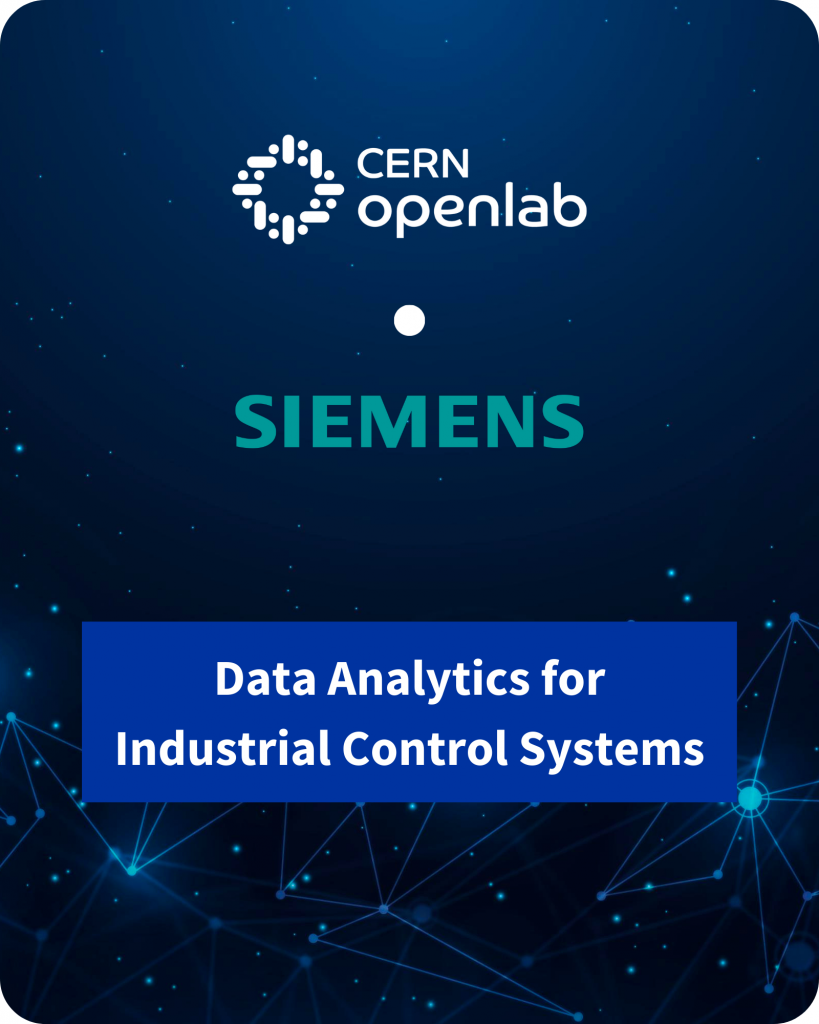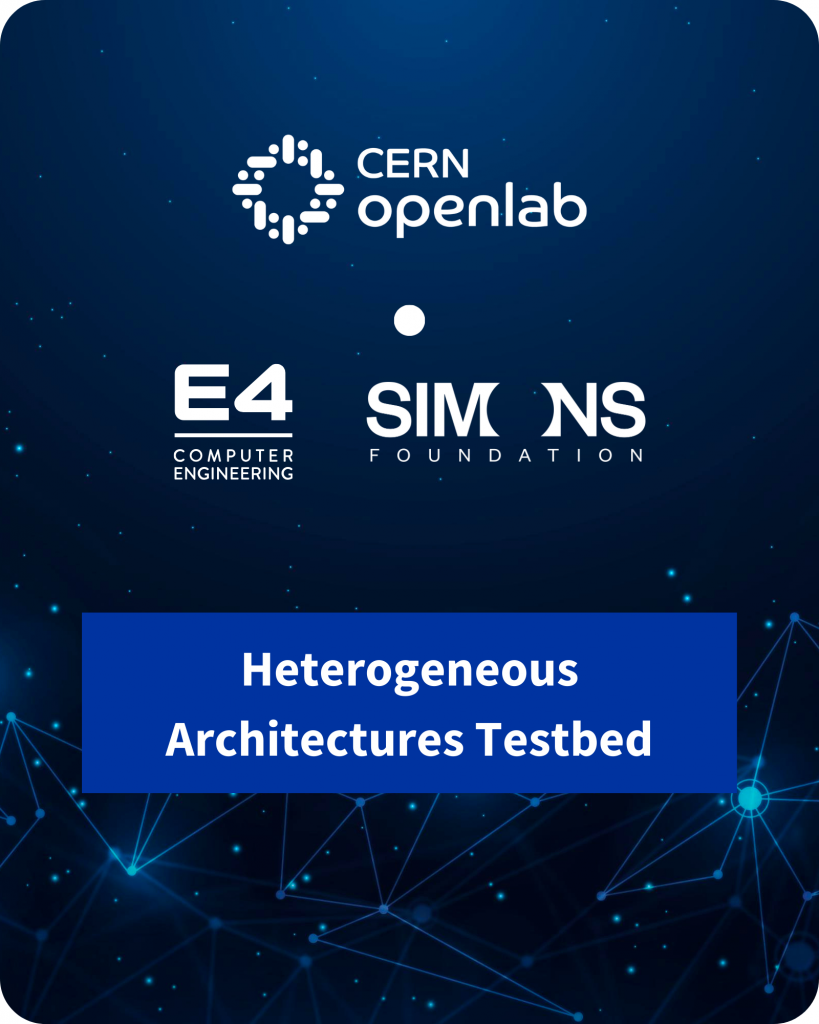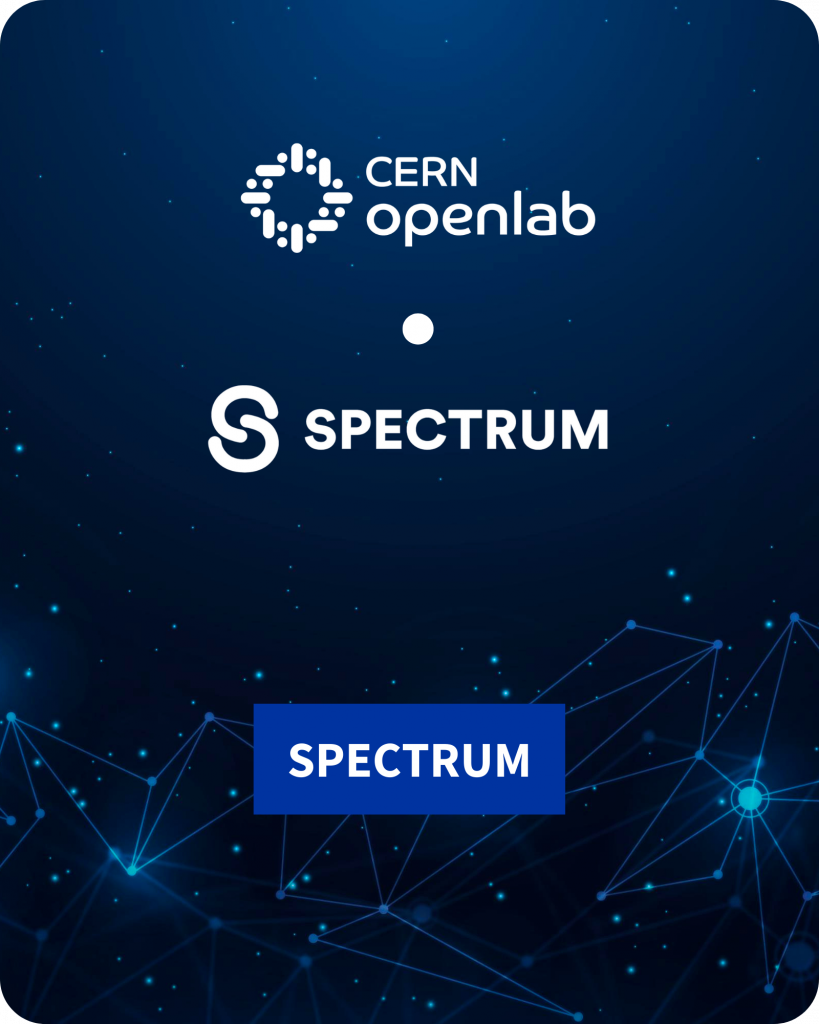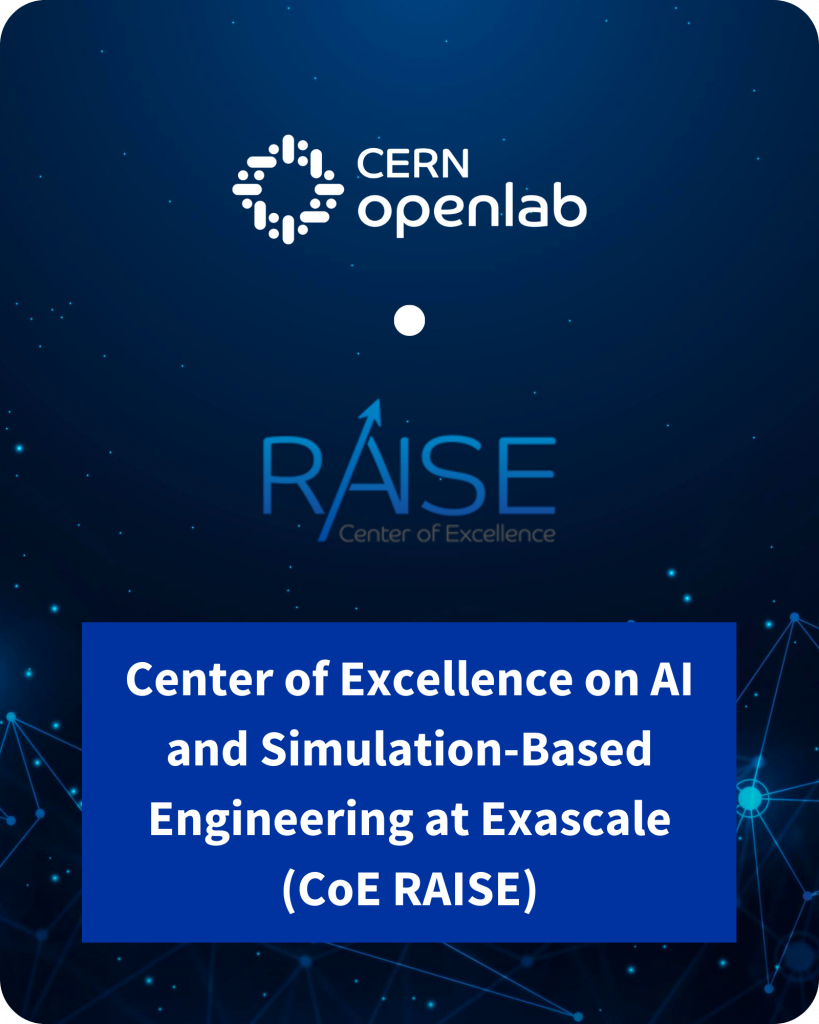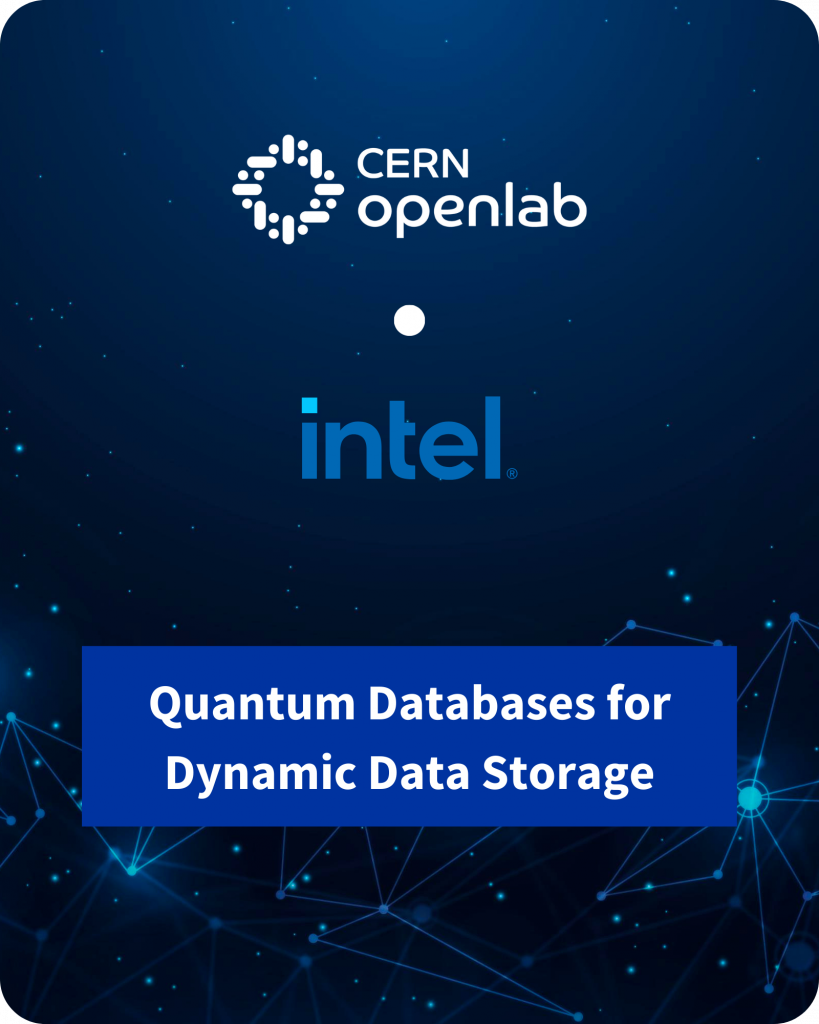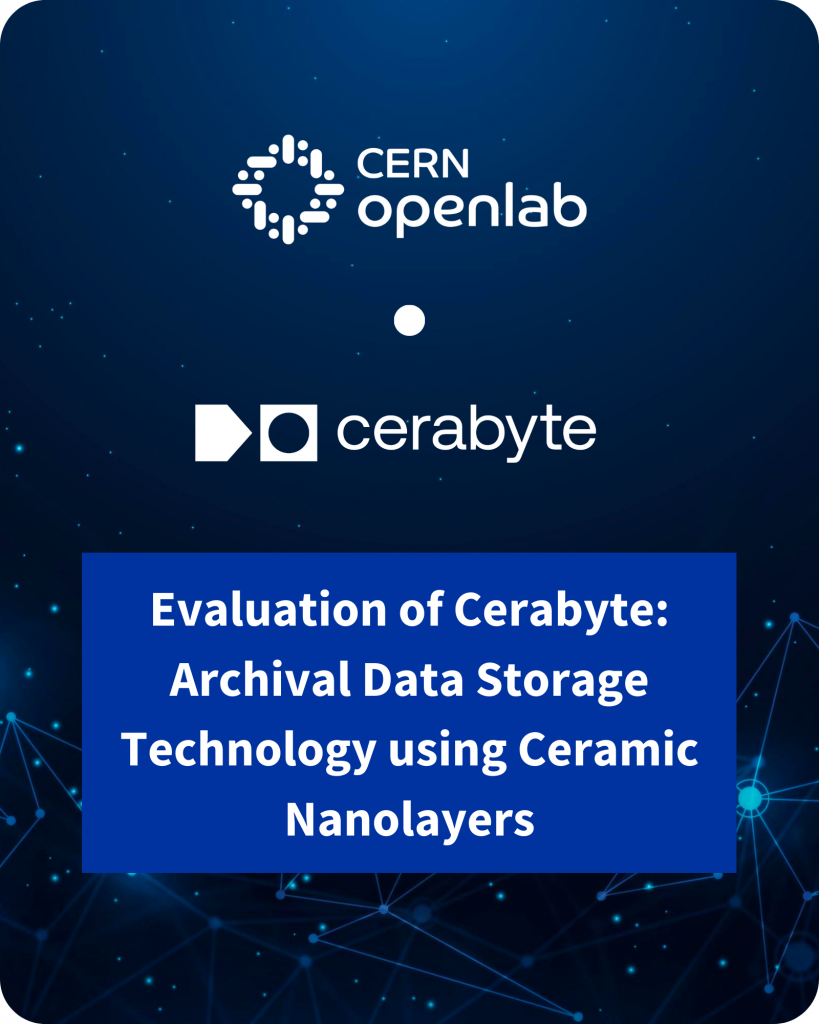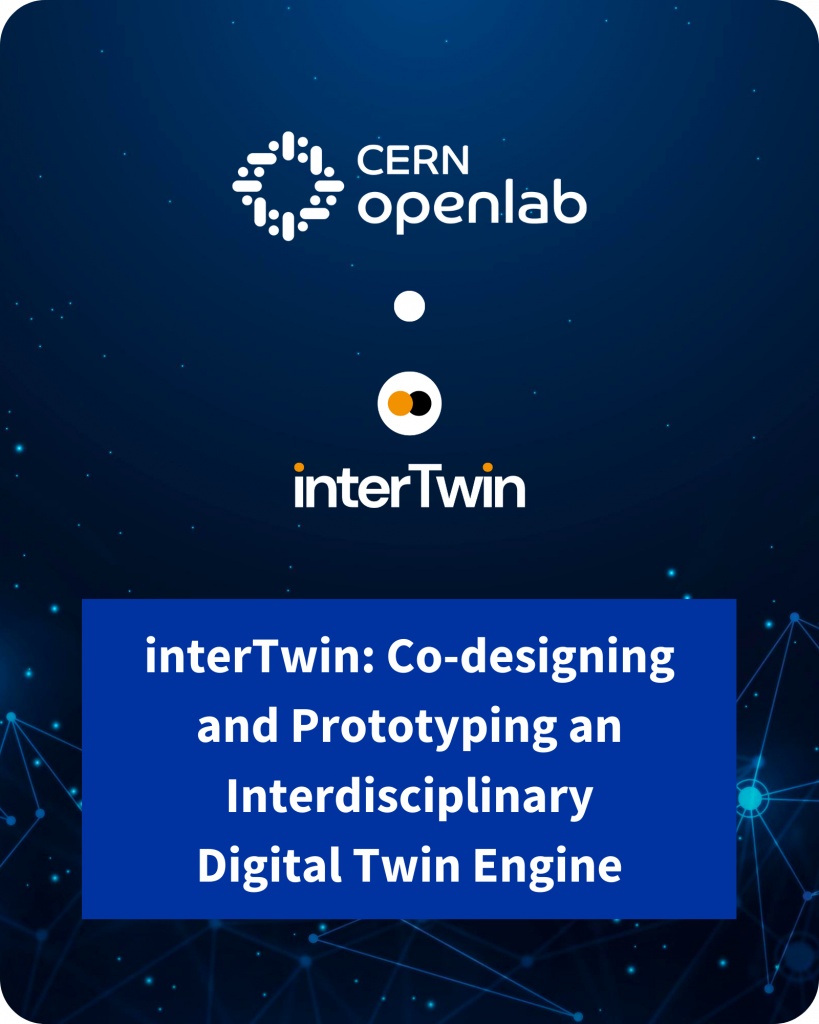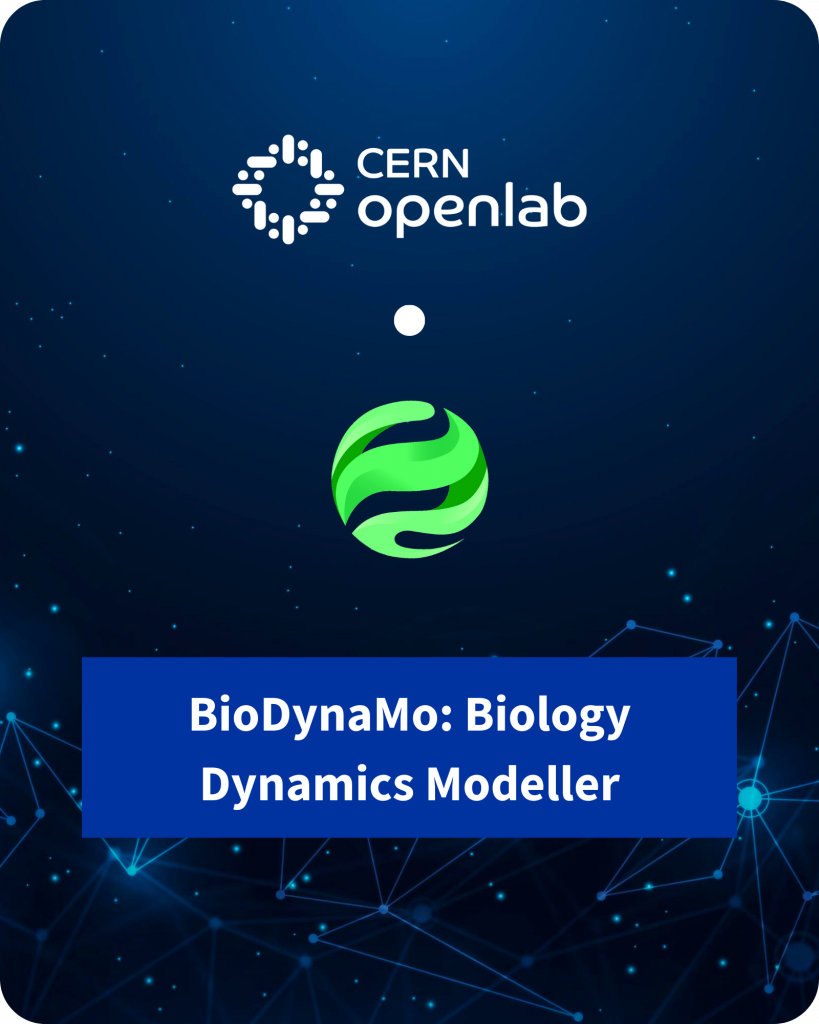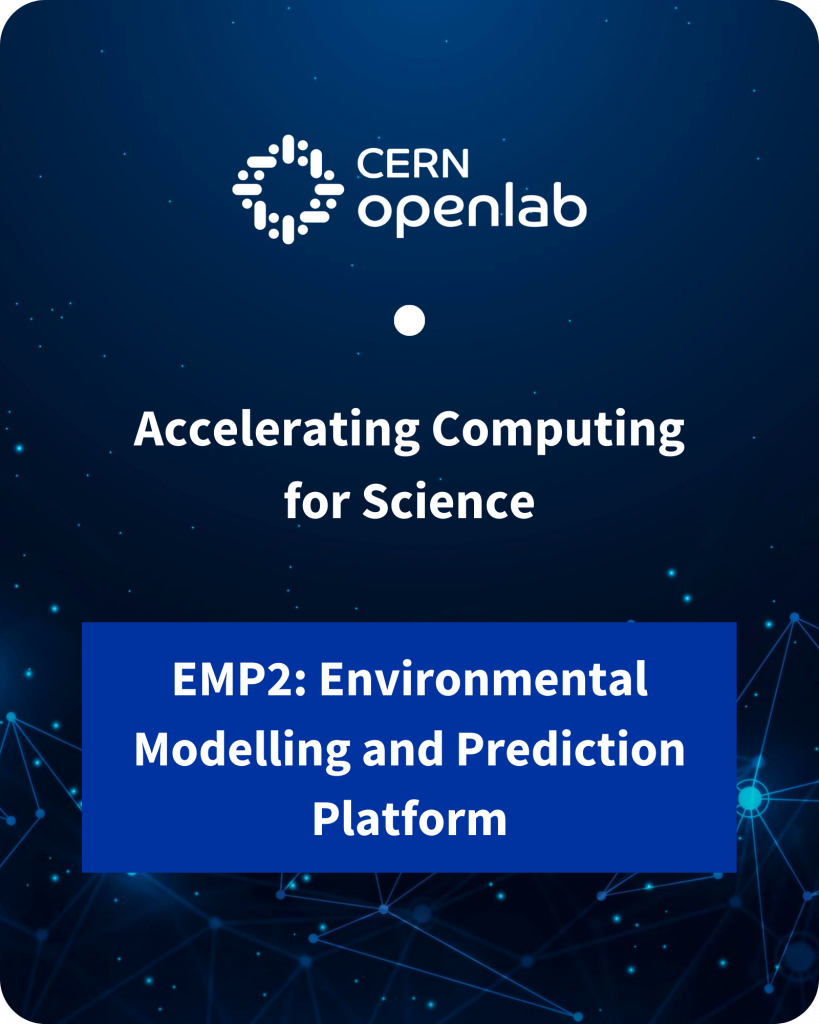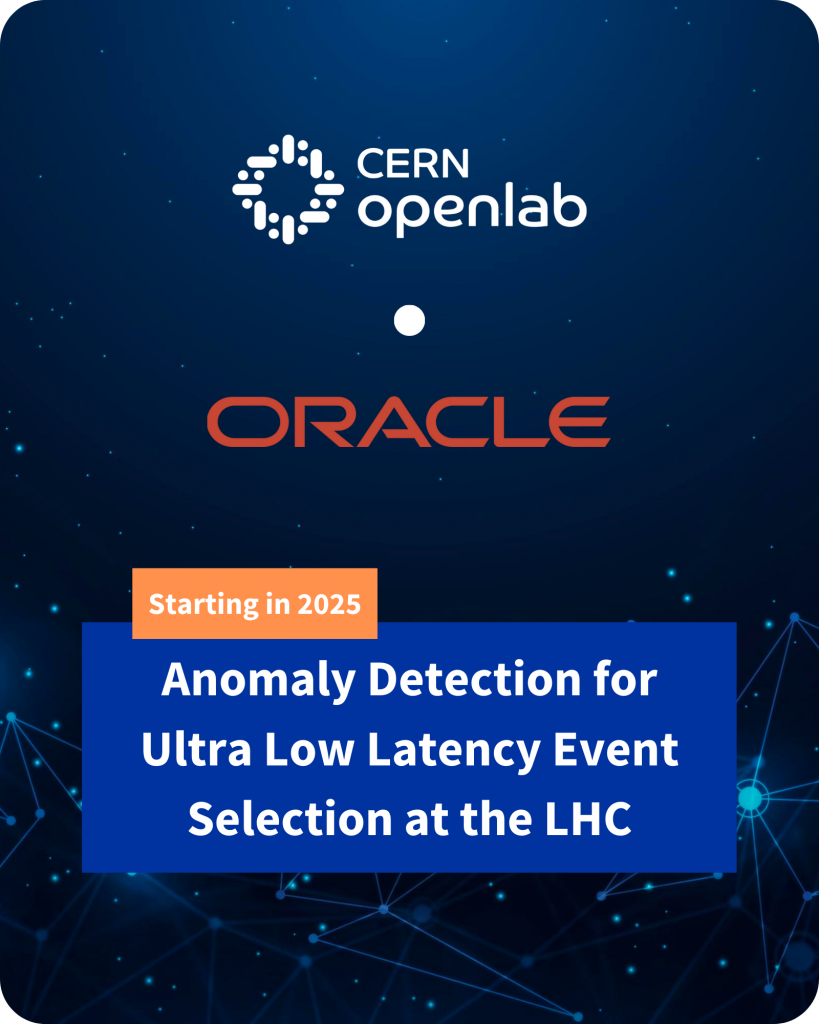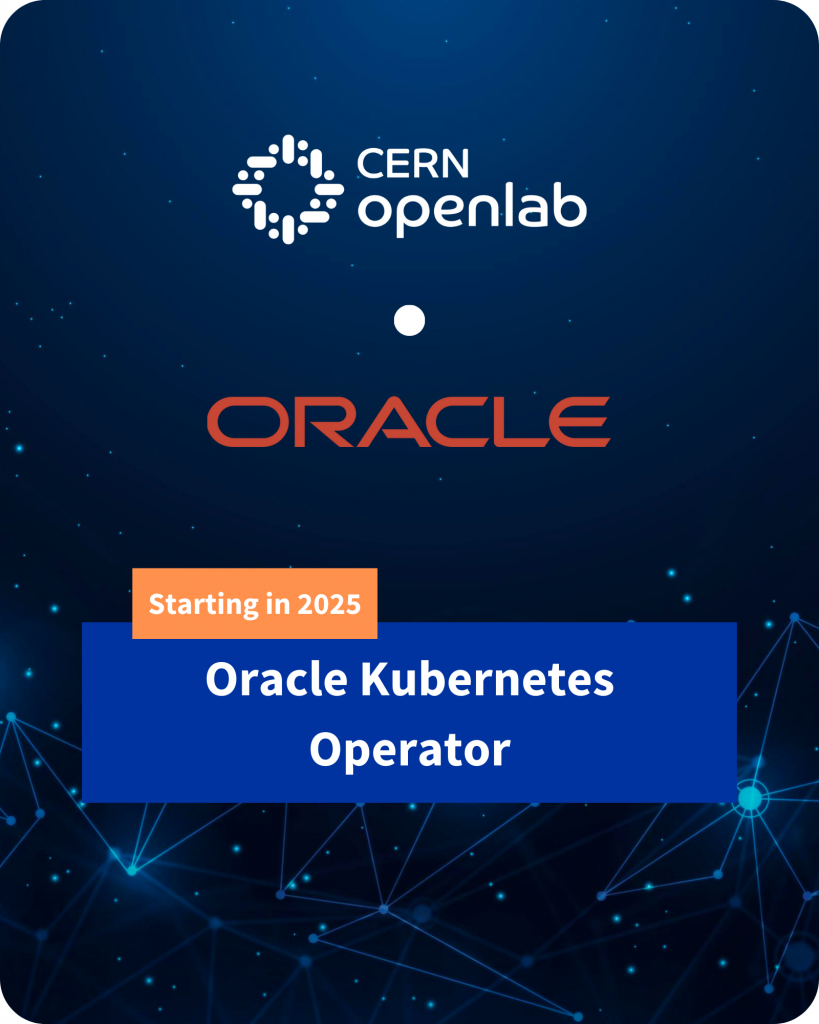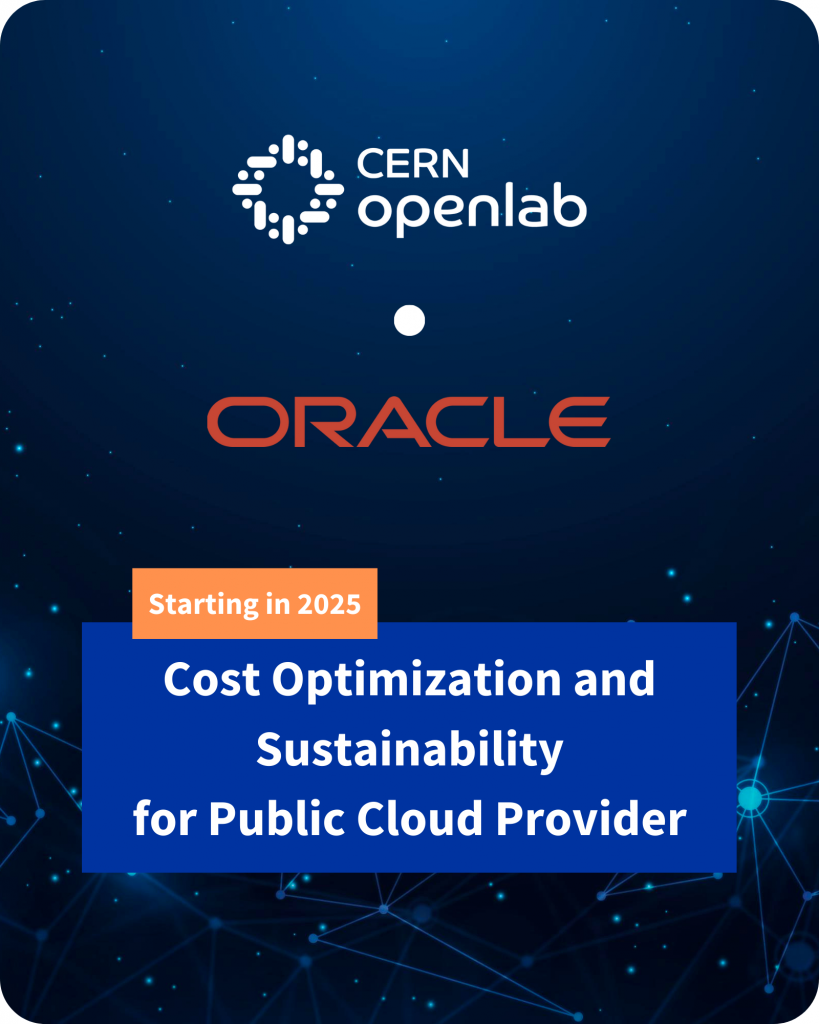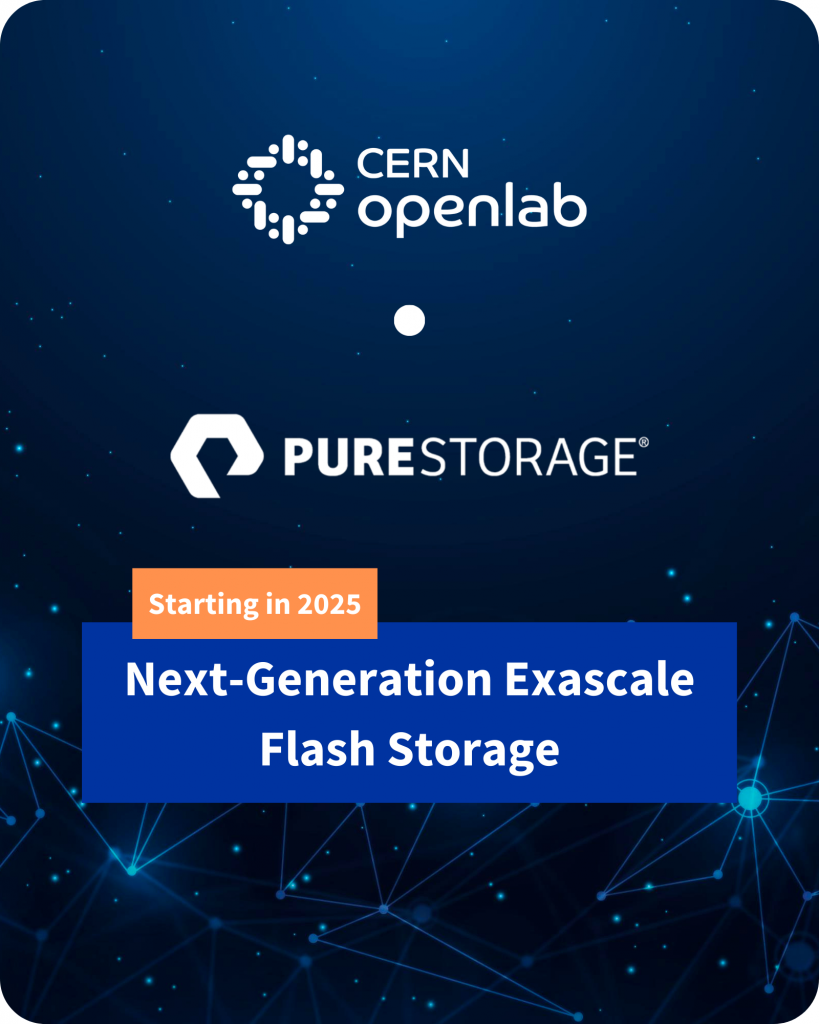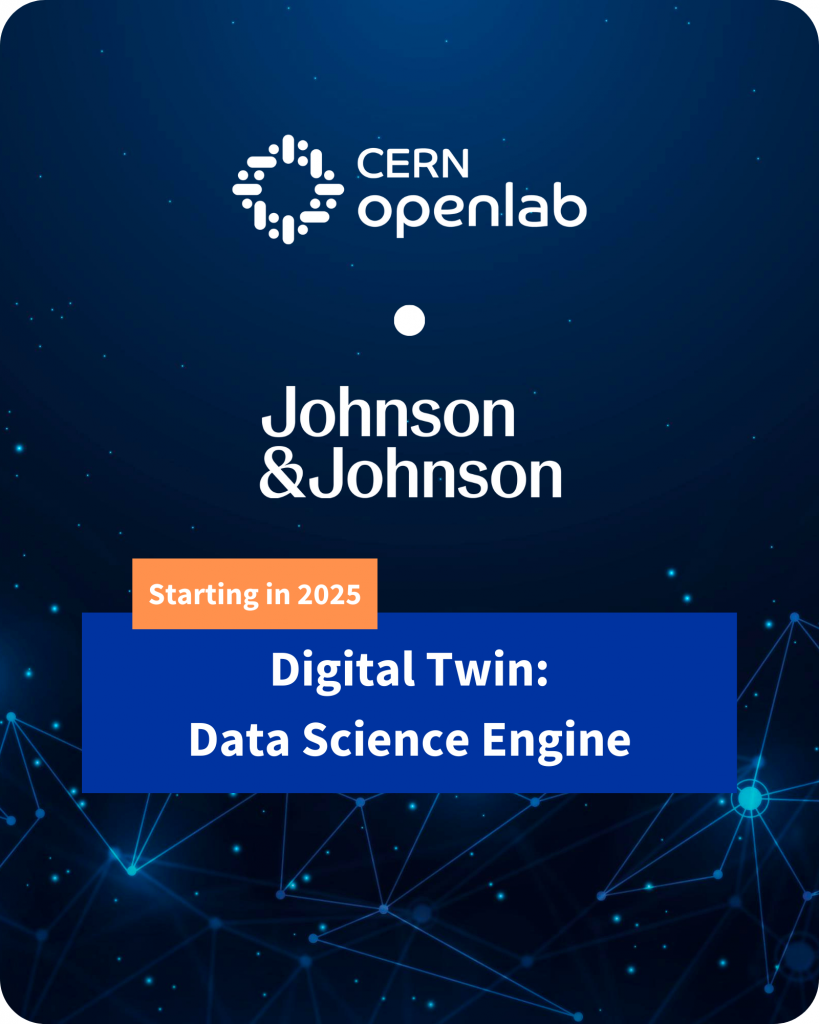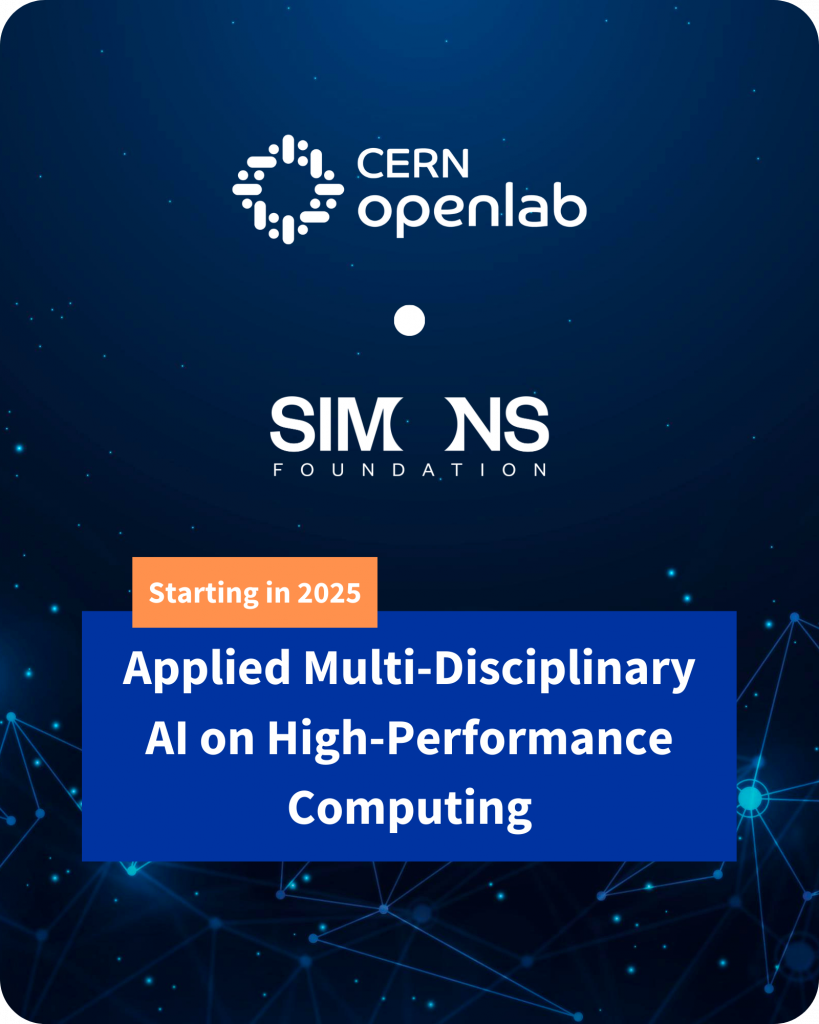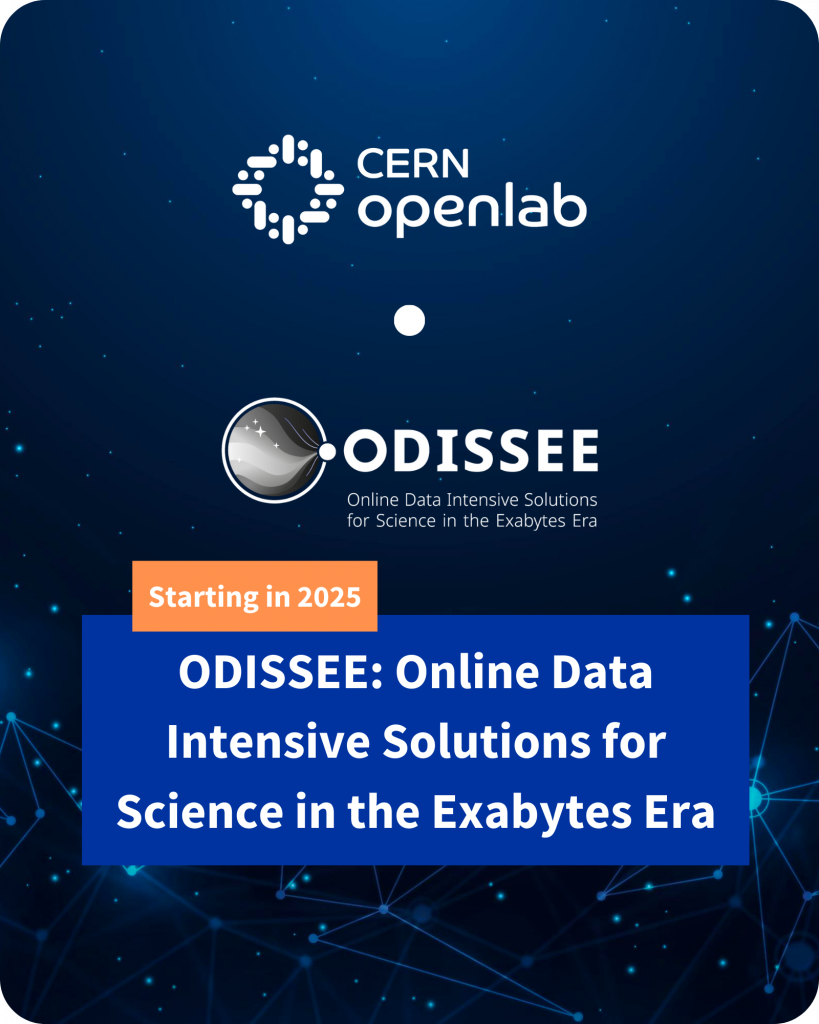2024 Annual Report
Foreword
It is with great enthusiasm that I present the CERN openlab 2024 Annual Report, a reflection of the remarkable achievements and collaborative spirit that define our unique collaboration. This year, we have once again demonstrated the transformative power of bringing together industry, researchers, and academic institutions to push the boundaries of scientific and technological innovation.
As CERN continues its mission to unravel the mysteries of the universe, CERN openlab serves as a vital bridge, ensuring that state-of-the-art computing technologies are harnessed to meet the immense challenges of data analysis and simulation at unprecedented scales. In 2024, our partnerships deepened across domains such as artificial intelligence, high-performance computing, digital twins, and advanced storage solutions, enabling breakthroughs that not only empower fundamental physics research but also drive broader societal impact.
At the heart of CERN openlab’s success lies its collaborative essence. By fostering an environment where expertise is shared freely and challenges are tackled collectively, we have created a thriving ecosystem where ideas are transformed into tangible advancements. This year’s projects highlight the immense potential of such partnerships, from improving data-processing pipelines to developing innovative applications of emerging technologies that extend beyond high-energy physics.

Maria Girone – Head of CERN openlab
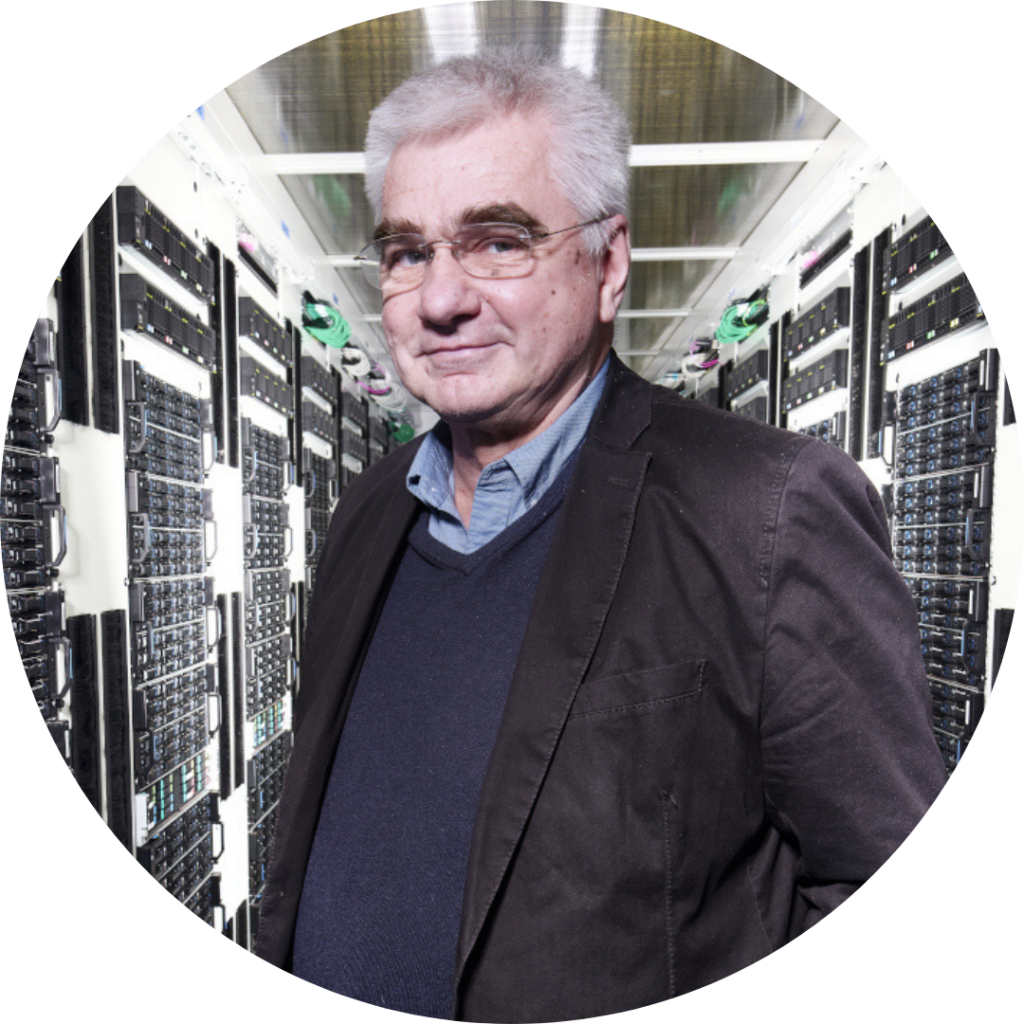
“CERN openlab is key to CERN’s mission, serving as a bridge between cutting-edge industry technologies and the computing needs of our scientific community. By fostering innovation and collaboration, it ensures we have the tools to process and analyse the immense volumes of data generated by our experiments, driving discoveries that expand our understanding of the universe.”
Joachim Mnich -CERN Director for Research and Computing
“CERN openlab is an essential pillar of the CERN IT department, driving innovation and enabling us to tackle the unprecedented computing challenges of modern physics. Through collaboration with industry and academia, it brings frontier technologies into our infrastructure, ensuring we remain agile, efficient, and ready to support the scientific discoveries of tomorrow.”
Enrica Porcari – Head of CERN IT Department
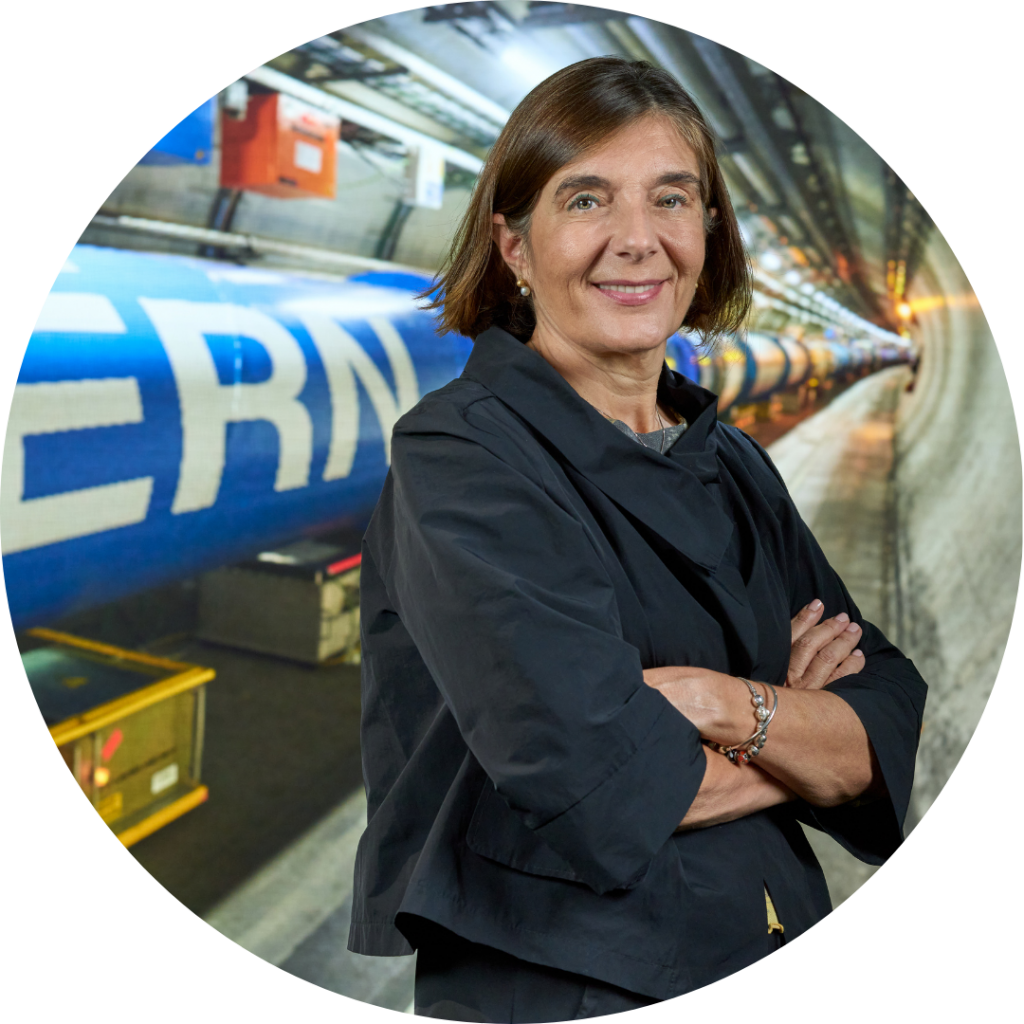
Testimonials

“With our data processing R&D we benefit significantly from CERN openlap, through its connections to relevant industry partners for joint R&D, through access to future and innovative hardware and HPC resources and expertise. We also rely on CERN openlab’s engagement to ‘keep things running’ by providing technical and administrative support, supplying us with bright students and providing us with smoothly operating monster hardware.”
Axel Naumann – Senior Applied Physicist at CERN EP-SFT
“Having recently joined CERN openlab, as project leader of the ATLAS Trigger and Data Acquisition (TDAQ) system, I really appreciate the boost CERN openlab provides by enabling the 92 institutes involved in TDAQ to interact effectively with industrial partners. These contacts can play an important role in our upgrade programme for the High-Luminosity LHC. The CERN openlab team is very committed to helping us, and in a few months we have managed to start interesting projects in the field of AI, state-of-the-art GPU architectures and the deployment of anomaly detection algorithms in the Level-1 Trigger system, which is currently taking data. At the end of 2025, ATLAS will have to make important architectural choices, and the CERN openlab team allows us to have a much broader view of what is at the cutting edge of technology.”
Stefano Veneziano – Senior Applied Physicist at CERN EP-ADT-TR


“CERN openlab collaboration provides a great framework for developing solutions to some of CERN’s unique computing challenges while leveraging the most recent cutting-edge technologies of our partners. The strength of openlab lies in innovation and their highly driven and engaged teams who understand the value of bridging academia and industry. It is an excellent opportunity for young professionals to work at CERN and to contribute to innovative projects with industry leaders.”
Aleksandra Wardzinska – CERN IT Platforms & Workflows Group Leader
“By engaging in collaboration with leading ICT companies through CERN openlab, the IT department and groups are able to integrate complementary knowledge, skills and resources. It is a fantastic opportunity to work together to create new ideas and develop even more powerful technologies that will advance both science and industry.”
Eva Dafonte Pérez – CERN IT Databases and Analytics Group Leader


“CERN openlab is an essential platform for implementing the R&D roadmap for storage and data management for the High-Luminosity LHC era, and beyond. Our ongoing industrial collaborations within CERN openlab include understanding transformational potential of new media for long-term data archival, exploration of storage requirements for ML/AI applications and optimization of high-performance, ultra-dense solid-state storage for physics data workflows. These projects are a vital part of our strategy to ensure that our storage capabilities continue to meet the requirements of CERN’s scientific programme, now and in the future.”
Jakub T. Mościcki – CERN IT Storage & Data Management Group Leader
“CERN openlab is a very special partner for IDEAS4HPC. Our mission is to facilitate the access of scientists from under-represented groups to scientific and technical training of the highest-ranking institutions. We are very pleased to be able to support female students to attend the renowned CERN openlab Summer Students Programme.”
Marie-Christine Sawley – HPC and Exascale Advisor at ICES Foundation Geneva

Our members
R&D directions
Updates on Sustainable Infrastructures Projects
Discover our projects under the R&D direction ‘Sustainable Infrastructures’ and their progress in 2024.
Updates on Emerging Technologies Projects
Discover our projects under the R&D direction ‘Emerging Technologies’ and their progress in 2024.
Discover the Projects Starting in 2025
CERN openlab as a Strategic Partnership Incubator
CERN openlab has established a strategic partnerships incubator model by fostering collaborations that leverage cutting-edge computing infrastructures to address scientific and technological challenges. By partnering with leading technology companies, research institutes, and universities, CERN openlab accelerates the development of innovative solutions in areas such as high-performance computing, artificial intelligence, and data storage. Acting as an incubator for these initiatives, CERN openlab paves the way for longer-term partnerships, driving advancements that benefit both the scientific community and industry at large.
Strategic Partnership on Artificial Intelligence
This collaboration between WFP, CERN and LIST offers an unique opportunity to bridge the gap between cutting-edge research and real-world application. By combining WFP’s extensive experience in humanitarian operations with CERN’s expertise in AI and LIST’s capabilities in EO, this project aims to deliver tangible improvements for people facing food insecurity. The strategic partnership on Artificial Intelligence between CERN, WFP, LIST and the Government of Luxembourg is the most recent example of CERN openlab identifying new partnerships and leveraging its implementation model to act as an initial incubator for longer-term collaborations.
In collaboration with: Luxembourg Institute of Science and Technology (LIST) and the World Food Programme Innovation Accelerator

Training & Education
In order to prepare for the future of scientific computing, it is vital to ensure that the computing specialists of tomorrow have the right skills to take full advantage of new, innovative technologies. Through projects, lectures and workshops, CERN openlab equips the future computer scientists with indispensable knowledge that inspires scientific advancement and fuels innovation. As a part of the education and training programme, CERN openlab runs various initiatives that support participation of young scientists and other research organisations.
CERN openlab summer student programme
The CERN openlab summer student programme provides undergraduate and master’s level students with an opportunity to work on one of the R&D projects for nine weeks under experts’ supervision. In addition, the public is granted access to CERN openlab lectures, which cover a broad spectrum of computing subjects, ranging from AI to exascale computing and quantum technologies. To foster community growth, CERN openlab provides ongoing specialised technical training to members of the scientific community.
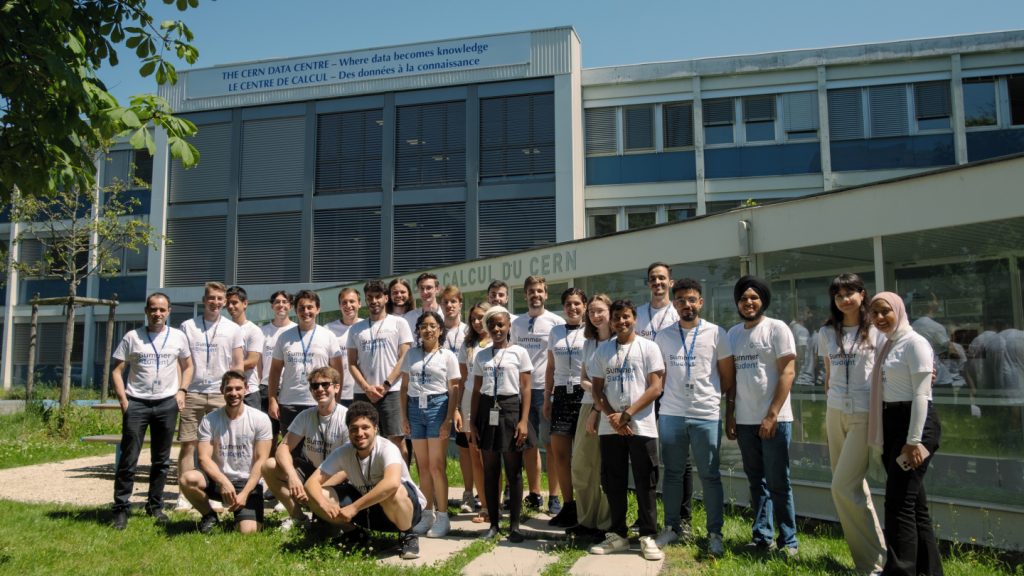
Collaboration with ideas4HPC
CERN openlab joined forces with ideas4HPC to sponsor a CERN openlab Summer Student, promoting the participation of women in high-performance computing research. ideas4HPC aims to promote inclusivity and diversity in HPC by creating targeted scholarships to support participation in top conferences or running training sessions for mentors. With our summer student programme, we are committed to improving girls’ participation in ICT and will continue championing for more women’s involvement in ICT.
Lectures, Workshops & Hackathons
Besides the CERN openlab lectures and the summer student programme, CERN openlab projects also contributed to some hackathons. Organised by the CMS collaboration, and with input from CERN openlab researchers working on the project with Micron Technologies, three hackathons were hosted throughout the year at the CERN IdeaSquare, where work on the CXL implementation of the data acquisition software was accelerated and spotlighted.
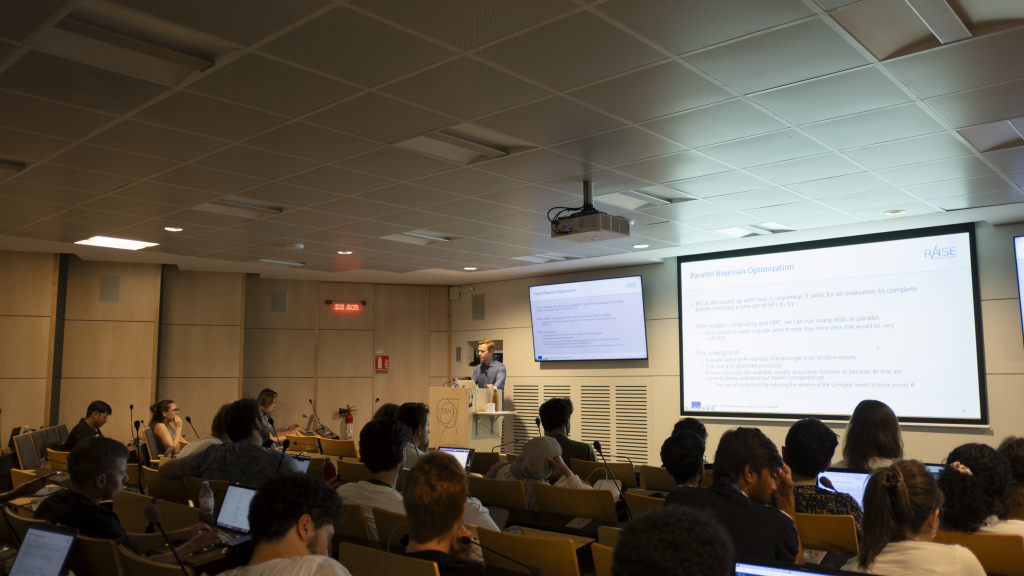
2024 Technical Workshop
CERN openlab holds an yearly Technical Workshop where members of CERN openlab engage with industry members and the ICT community to showcase the work being done, review of the R&D projects carried out during the past year and discuss future plans. This event features technical talks, poster sessions and technology tracks dedicated to our industrial partners with invited speakers.
In 2024, the Annual CERN openlab Technical Workshop was held at CERN Science Gateway and was attended by more than 130 in-person participants, drawing in experts from multiple companies and research institutes, demonstrating the critical role of public-private partnerships in propelling scientific research.
Participants engaged in rich discussions on the ongoing projects at CERN openlab, delving into the challenges and opportunities at the intersection of technology and science. As well as discussing ongoing projects, the workshop provided an excellent opportunity for considering emerging challenges and identifying opportunities for mutually beneficial collaboration.
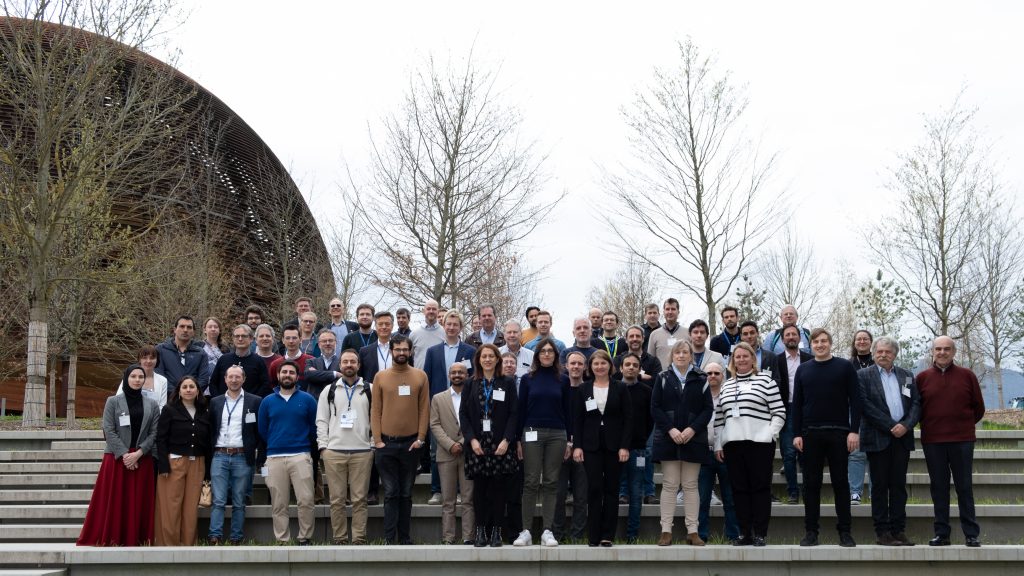
The 2024 CERN openlab Technical Workshop presentations encompassed the following topics: Heterogeneous Computing Platforms and Infrastructures, AI applications and HPC Convergence, Applications for Society and Environment, Cloud and Storage, Quantum Computing. Presentations from industry partners were also given.
Maria Girone, the head of CERN openlab, unveiled the ambitious goals of Phase VIII in her presentation. She underlined CERN openlab’s unique position as a bridge between industry and scientific research: “Our initiative serves as a unique model for collaboration between science and industry. With Phase VIII, we are committed to pioneering research in emerging technologies and sustainable infrastructures, setting a fast pace for advancements in scientific computing.”
As well as discussing ongoing projects, the workshop provided an excellent opportunity for considering emerging challenges and identifying opportunities for mutually beneficial collaboration. This workshop was a venue for presentations and an event to foster future collaborations, showcasing the importance of co-development between industry and the research environment.
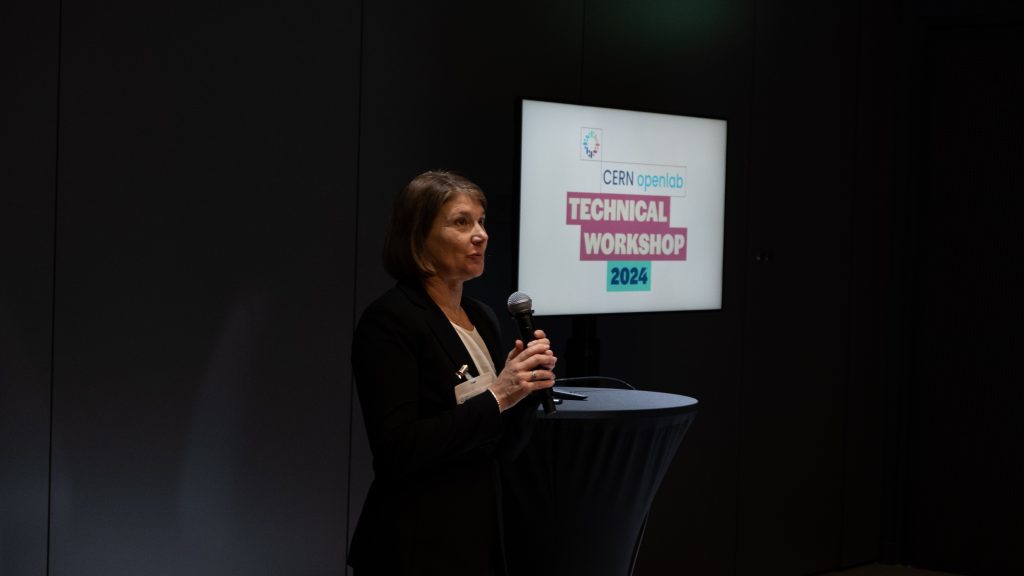
Communication & Outreach
CERN openlab serves as a hub of knowledge, dedicated to sharing insights through outreach initiatives and educational programs. In addition to showcasing our technical advancements to diverse stakeholders, we are committed to nurturing the next generation of ICT specialists. By fostering collaboration, CERN openlab enables its members to develop and promote a shared vision for the future of scientific computing. This vision reaches a broad audience, including partner organizations, policymakers, journalists, and the general public. Together, we strive to shape the future of scientific computing to benefit both research and society as a whole.
In 2024, the CERN openlab annual report was revived, a vital tool for communication and outreach, serving as a comprehensive showcase of the collaboration’s achievements, initiatives, and future aspirations. It provides a clear and accessible overview of the cutting-edge R&D projects undertaken with our industry partners, highlighting their impact on scientific computing and their contributions to CERN’s mission.
This year, we have significantly enhanced our social media presence with the launch of the CERN openlab LinkedIn account, which quickly garnered over 4,000 followers in less than six months. Through LinkedIn, we have shared multiple articles highlighting our projects, achievements, and opportunities, broadening our reach and fostering connections with stakeholders. This increased visibility strengthens our ability to promote CERN openlab’s vision and impact, while also inspiring collaboration and innovation in the ICT community.
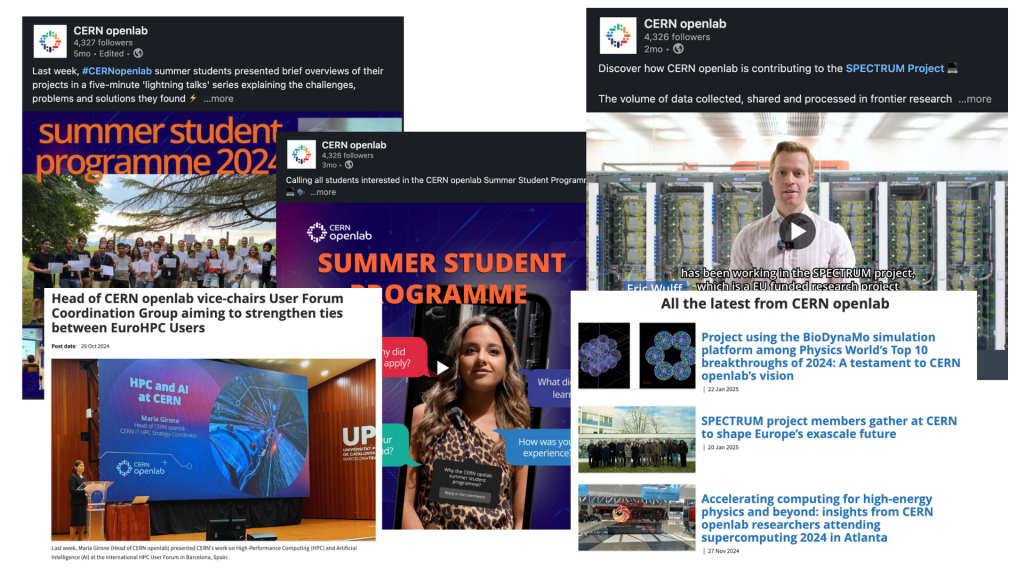
In the coming year, we will be developing even more exciting communication actions for digital communication with our partners. Through dynamic blog posts, engaging news articles, and captivating social media posts, we are committed to engaging more with our partners to showcase the incredible work we are developing and its importance.
News from the Lab with CERN Alumni
News from the Lab, organised by the CERN alumni team, was designed to showcase the amazing work carried out at the Lab, CERN colleagues are invited to share their work with CERN alumni to help them reconnect with CERN and its collaborations and keep up to date with the latest news from CERN. In turn, this enables alumni to become CERN ambassadors in their own networks. CERN openlab participated in this event last year and showcased its news, goals and vision for the recently launched Phase VIII. A big thank you to the CERN alumni team for the invite and collaboration.
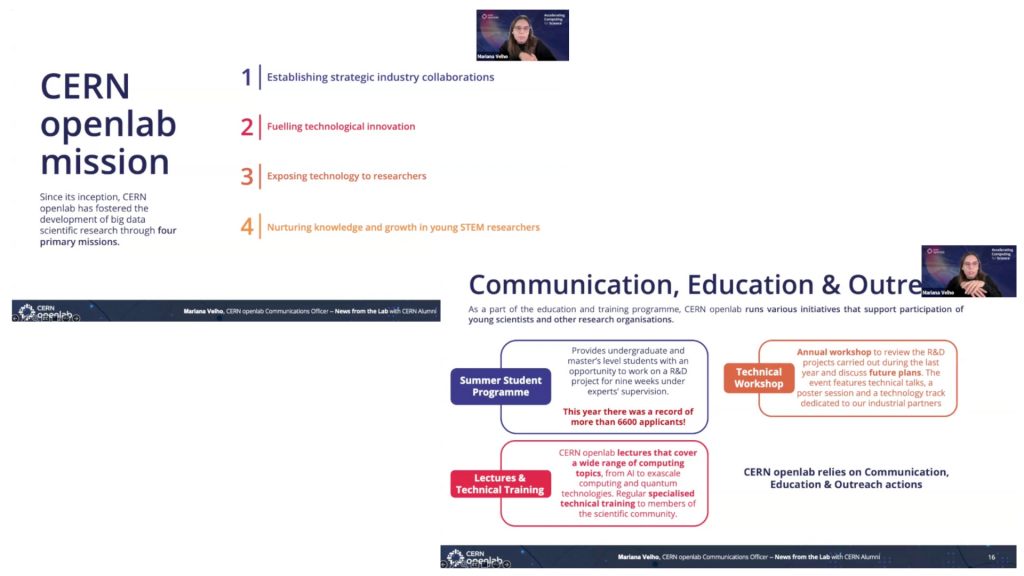
Publications & Presentations
Framework for a Quantum Database
C. Rieger, Operational Framework for a Quantum Database (8.4.24), Presentation at TUM Raitenhaslach Seminar, Raitenhaslach, 2024
A technical overview of industry-science R&D projects for the High Luminosity LHC under CERN openlab
T. James, L. Atzori, et al., A technical overview of industry-science R&D projects for the High Luminosity LHC under CERN openlab (22 October). Presented at CHEP, Krakow, 2024. URL: https://indico.cern.ch/event/1338689/ contributions/6011145/
A technical overview of industry-science R&D projects for the High Luminosity LHC under CERN openlab
T. James, L. Atzori, et al., A technical overview of industry-science R&D projects for the High Luminosity LHC under CERN openlab (22 October). Presented at CHEP, Krakow, 2024. URL: https://indico.cern.ch/event/1338689/ contributions/6011145/
WP4: Data-Driven UseCases at Exascale
E. Wulff, Maria Girone, WP4: Data-Driven UseCases at Exascale (28 May 2024). Presented at the Third CoE RAISE All-Hands meeting, Barcelona, Spain, 2024.
Center of Excellence for Research on AI- and Simulation-based Engineering at Exascale (CoE RAISE)
E. Wulff, M. Girone, D. Southwick, J.P. Amboage, Center of Excellence for Research on AI- and Simulation-based Engineering at Exascale (CoE RAISE). Poster presented at the 2024 CERN openlab Technical Workshop (26 March 2024), Geneva, Switzerland 2024.
Data Processing Needs and Trends in High Energy Physics
D. Southwick, M. Girone, Data Processing Needs and Trends in High Energy Physics, presented at the EGI2024 conference.
Real-time Data Processing for CMS Level-1 Trigger using CXL Memory Lake Architecture
T. James, E. Meschi, G. Lazzari Miotto, Real-time Data Processing for CMS Level-1 Trigger using CXL Memory Lake Architecture (26 March). Presented at CERN Openlab Workshop, Geneva, 2024. URL: https://indico.cern.ch/event/1356148/ contributions/5818261/
Defect-free metal additive manufacturing
Defect-free metal additive manufacturing
Improved particle-flow event reconstruction with scalable neural networks for current and future particle detectors
J. Pata, E. Wulff, F. Mokhtar, et al. Improved particle-flow event reconstruction with scalable neu-ral networks for current and future particle detectors. Commun Phys 7, 124, Apr 2024, https://doi.org/10.1038/s42005024-01599-5
Real-time Level-1 Trigger Data Scouting at CMS using CXL Memory Lake
T. James, E. Meschi, G. Lazzari Miotto, Real-time Level-1 Trigger Data Scouting at CMS using CXL Memory Lake, Conference on Computing in High Energy and Nuclear Physics, Krakow, Warsaw, Oct 19-25th 2024
Operational Framework for a Quantum Database
C. Rieger, Operational Framework for a Quantum Database (17.7.24), Poster presentation at US QIS School Oak Ridge National Lab, Oak Ridge, 2024
C. Rieger, Operational Framework for a Quantum Database (17.9.24), Poster presentation at IQOQI Innsbruck conference, Innsbruck, 2024
C. Rieger, Operational Framework for a Quantum Database (21.1.25), Poster presentation at QT4HEP conference, Geneva, 2025
Rieger, Carla, et al. “Operational Framework for a Quantum Database.” arXiv preprint arXiv:2405.14947 (2024)
Event Reconstruction and Classification at the HL-HLC
E. Wulff, D. Southwick, M. Girone, A. Lektauers, Event Reconstruction and Classification at the HL-HLC (28 May 2024). Presented at the Third CoE RAISE All-Hands meeting, Barcelona, Spain, 2024.
Benchmarking Heterogeneous Architectures with HEPScore
D. Southwick, L. Atzori, et al., Benchmarking Heterogeneous Architectures with HEPScore (26 March). Presented at CERN Openlab Workshop, Geneva, 2024. URL: https://indico. cern.ch/event/1356148/contributions/5799887/
Scaling Laws for Machine-Learned Reconstruction
E. Wulff, M. Girone, J. Pata, Scaling Laws for Machine-Learned Reconstruction (4 June 2024), Poster presented at the PASC24 conference, Zurich, Switzerland 2024.
Distributed Training and HPO at Centre of Excellence on AI and Simulation-Based Engineering at Exascale
E. Wulff, M. Girone, J.P. Amboage, J. Pata, Distributed Training and HPO at Centre of Excellence on AI and Simulation-Based Engineering at Exascale (CoE RAISE). Presented at the 2024 CERN openlab Technical Workshop (26 March 2024), Geneva, Switzerland 2024.
CXL Memory Management for the CMS L1 Scouting System and Beyond
T. James, G. Lazzari Miotto, G. Paulino, CXL Memory Management for the CMS L1 Scouting System and Beyond, (Summer Student Report), Dec 2024, https://zenodo.org/records/14629426
itwinai
M. Bunino, K. Tsollaki, et al., itwinai (June). Presented at ISC, Hamburg, 2024.
Data Analytics for Industrial Control Systems
A. Patil, Data Analytics for Industrial Control Systems (26 March). Presented at CERN openlab Technical Workshop, Geneva, 2024.
Seismic imaging with remote sensing for energy applications
Seismic imaging with remote sensing for energy applications
Long-term high-volume data storage in ceramic
C. Pflaum, S. Hellmold, Long-term high-volume data storage in ceramic (14 March). Presented at ACAT, New York, 2024. URL: https://indico.cern. ch/event/1330797/contributions/5776099/
Heterogeneous Architectures Testbed @ CERN and E4 project
J. Santos, L. Atzori, et al., Heterogeneous Architectures Testbed @ CERN and E4 project (26 March). Presented at CERN Openlab Workshop, Geneva, 2024. URL: https://indico.cern.ch/ event/1356148/contributions/5799880/
interTwin – an Interdisciplinary Digital Twin Engine for Science
M. Bunino, A. Zoechbauer, et al., interTwin – an Interdisciplinary Digital Twin Engine for Science (26 March). Presented at CERN Openlab Workshop, Geneva, 2024. URL: https://indico. cern.ch/event/1356148/contributions/5799927/
Hyperparameter Optimization for Deep Learning using High Performance Computing
E. Wulff, Hyperparameter Optimization for Deep Learning using High Performance Computing (9 July 2024). Presented at the CERN openlab Summer Student Lecture Programme, Geneva, 2024.
Distributed hybrid quantum-classical performance prediction for hyperparameter optimization
E. Wulff, J.P. Garcia Amboage, M. Aach, et al., Distributed hybrid quantum-classical performance prediction for hyperparameter optimization. Quantum Mach. Intell. 6, 59, Sept 2024, https://doi.org/10.1007/s42484-024-00198-5
Calibration of stochastic, agent-based neuron growth models with approximate Bayesian computation
T. Duswald, L. Breitwieser, et al. Calibration of stochastic, agent-based neuron growth models with approximate Bayesian computation. Journal of Mathematical Biology 89, 50, Oct 2024, https://doi.org/10.1007/ s00285-024-02144-2
interTwin & itwinai
M. Bunino, K. Tsollaki, et al., interTwin & itwinai (30 April). Presented at EUCAIFCon24, Amsterdam, 2024.
Sound Engineering
E. M. Sumner, Sound Engineering (28 May 2024). Presented at the Third CoE RAISE AllHands meeting, Barcelona, Spain, 2024.
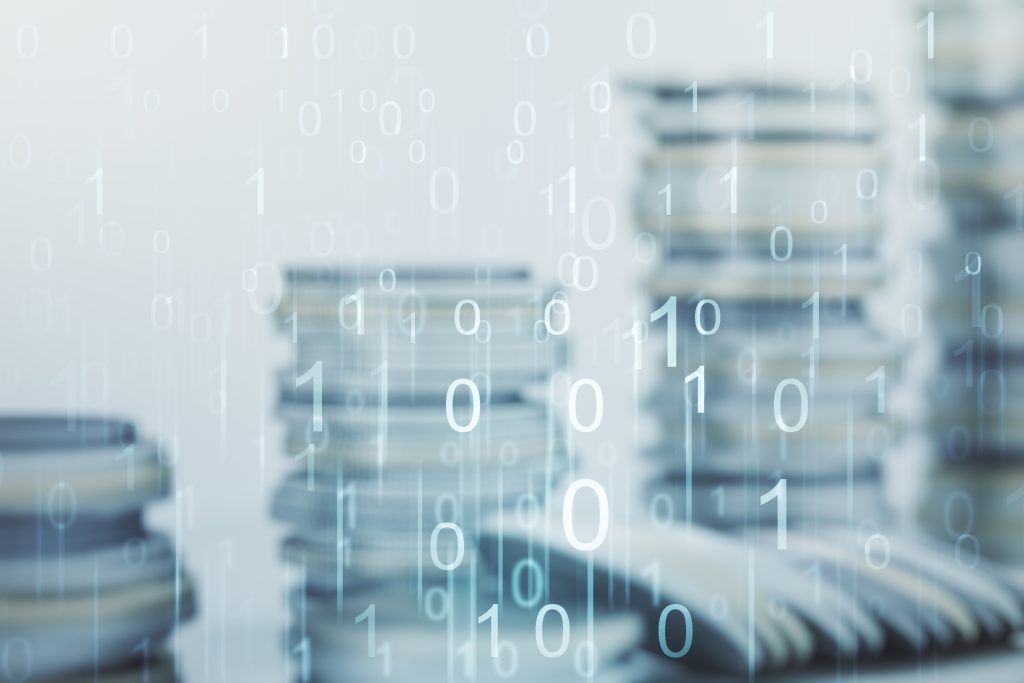
With thanks to
All partners who have collaborated with CERN openlab activities and everyone who has contributed to the content and production of this document.




